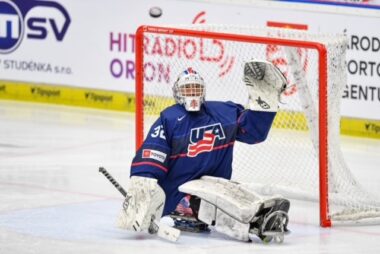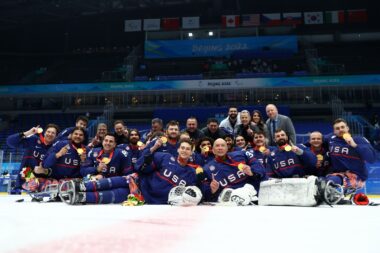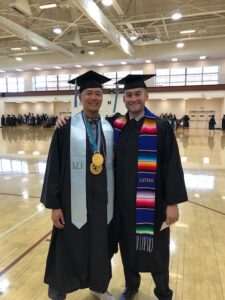
Life can take you in some unexpected directions, and Jen Lee understands that more deeply than most. The College of Education Sport Management alumnus (B.S. ’18) never envisioned himself going to college. Instead, he enlisted in the United States Army, with the intention of making it his permanent career. After returning from active duty in 2009, that path was unexpectedly disrupted when he lost his left leg in a motorcycle accident.
Like many injured veterans, Lee found sports rehabilitation essential to his recovery. Working through a physical therapy program at the VA Hospital in San Antonio, Lee discovered a love for sled hockey, a sport he’d previously known nothing about. He proved to be skilled enough to qualify for the U.S. Paralympic Sled Hockey team as a goalie, and would go one to help Team USA win gold medals at three consecutive Winter Paralympic Games.
In 2015, at the age of 28, Lee was accepted as a transfer student into The University of Texas at Austin, and in 2018, he graduated from the Sport Management program within the Department of Kinesiology and Health Education. He continues to play hockey and maintain his passion for sports, and for Texas. Recently, Lee spent time with us to share some thoughts on his unique path toward education, as well as his appreciation for the support he received from Veterans Services and his fellow Longhorns.
Tell us a bit about the path that you led you to the Paralympics and UT.
My way is a little unorthodox; it wasn’t like I graduated out of high school and was accepted at UT. I was actually a super late college student. I got accepted as a sophomore student at 28 years old. I graduated high school in 2004 and went straight into the U.S. Army and really had a great career. I even served one combat deployment for 15 months with my unit, from 2006-07. Fast forward two years later, that’s when one chapter closed and I opened another. It was a beautiful day in March 2009 and I got struck by a vehicle while on my motorcycle. It really changed the course of what I thought I was going to be. I thought I was going to be a “lifer,” as we call it, a soldier for life with a 20-year career. But that didn’t happen; when I got transferred to San Antonio to begin my therapy and rehabilitation, that’s when I was introduced to the Paralympics and the whole course of my life changed. I was accepted into UT a few years after that.
How did you get involved in sports and sports management?
Around the time (of my accident), our nation was still involved in two wars, one in Iraq and one in Afghanistan. San Antonio had a huge community of injured combat veterans, or guys like me who had been in accidents. Fortunately, at the rehab center, called the Center for the Intrepid, they had a program for learning to use prosthetics, with instructional courses on things like walking and gait. One thing they also wanted to emphasize was sports. Sports are such a huge thing for so many military veterans, so in 2009 they started military veteran Paralympic programs; you’d maybe have rehab three days a week, but in between you were focused on sports, lots of adaptive and therapeutic sports like wheelchair basketball, swimming, or learning to run with a prosthetic. Luckily for me there were a lot of programs available. Sled hockey is something I got involved in through that program; I had no idea I was going to be a sled hockey player or a Paralympian.
Tell us a bit about your path to the Paralympics.

Sled hockey was another therapeutic sport for us. For those who don’t know about it, it uses pretty much the same rules and requirements of ice hockey; the only difference is the players are on sleds and we have two long sticks instead of just one, and we’re using those sticks to propel ourselves with metal picks on the ends. It requires a lot of upper-body and core strength, it’s a very physical and hard sport. We had an all-veteran travel team that would compete with other sled hockey teams in the United States and little did I know that this sport was becoming very popular around the country. There were coaches and scouts watching the games, and I was recognized as having potential to make the national team down the road. I was asked to try out the following year and I made the national team for the 2011 season. Everything took off from there.
Do you still play?
I do! I’m still competing. I’m in Canada right now for some games.
In between Paralympic games, you transferred to UT from a small private university in San Antonio. What was that experience like for you?
I was super stoked. Something I dreamed of after getting out of the military was going to college. A lot of guys I served with had the whole college experience, everyone wearing their school colors and representing their teams. The University of the Incarnate Word was a small, private Catholic university, so being able to transfer to UT, where they have 50,000 students, the Forty Acres and all of that, that’s when I felt like I was really in college. Of course there’s the fun, but there’s also the educational aspect, and the level at UT was a bit more intense in terms of the expectations and the workload. So it wasn’t just about breezing through the courses, it was about treading above water.
Would you recommend the sports management program?
Absolutely. Not just for students, but for student athletes who want to stay involved in a sports program. I can say that, not just as an athlete but as a disabled veteran, there are different challenges as far as inclusiveness and equality, and on the sports management side, there were a lot of things I learned. Not just about the business side, but the ethics of it, the sociological impact; we get into the nitty-gritty of it. We’d learn about how these organizations came up, for example, how the NFL evolved from the AFL and then merged, or we’d learn about [Olympic gold medalist] Jim Thorpe and the discrimination he faced as a Native American. There was a lot of great information. Sports really shapes us, not just us as people or as Americans but as a culture.
Talk a bit about life after graduation. What came next for you?

As an athlete, I had the chance to compete in three different Paralympic games for Team USA, in Sochi, Russia in 2014, Pyeongchang, Korea in 2018 and just last year in Beijing, China. I came to UT just after getting back from Sochi, and from 2015 to 2018 I was trying to make my way back to the sled hockey team for the National Paralympic Roster. In a way, I was a student athlete myself, just through a different entity. There were challenges, like with any student athletes at UT: you need to study and work hard, but still need to perform and go to the games. There was a lot of learning and growth, and after I graduated, I understood the amount of discipline it takes to balance both sides of it.
How was your experience as a disabled veteran at UT? Did you have challenges? Did UT provide enough resources?
If it wasn’t for Student Veteran Services (SVS), or guys like Jeremiah [Gunderson, head of Veteran and Military Affiliated Services at UT], my life as a student would have been much harder. SVS was (and is) able to bring the veterans together. You could study or talk about your struggles, and it was a great place to just relax and get away from more crowded spaces. It gave us a sense of our own little group, not trying to be clique-y or anything like that, but it gave us people we could relate to. A lot of us were older students coming in, so there are a lot of connections in that, and there were a lot of resources SVS opened for us. They worked tirelessly to get more scholarships, more recognition, better acceptance rates for future veterans, so SVS played a huge role during my time at UT.
What advice would you like to share based off your life experiences?
For me, it’s about the passion and drive to want to accomplish something, whether it’s being a student at UT or being in the army or being an athlete—it all takes that inner self to get there. But at the same time, you can’t do it alone. You’ve got to have great resources, great support from family members, faculty, staff and professors. They’re not going to give you the answers but they’re going to lead you in the right way. You’re never too old for education, so if you feel like there’s no way you can go back or go to a big institution at 28 or 30, that’s not true at all. Maybe your mentality isn’t there at the beginning, but there’s always ways to circle back, because if the drive is there, if the hunger is there, it’ll come back. It’s a full circle, and I think it’s beautiful. I had no interest in going to college after high school, but after going to the military, you realize you have to “embrace the suck,” as we call it. After going through that you realize school might not be so intimidating and you might want to improve yourself.
What would you like your impact to be on the world?
Something I realized through my experience is that being a leader isn’t something you can just immediately grasp, and there are a lot of different ways of being a leader. UT athletes definitely have a great support system and great resources for the students. It doesn’t matter what sport you play, there’s always awareness and recognition. Being a Paralympian, there’s still an uphill battle to get that same level of recognition. There are many students from UT representing the Paralympics, and I think it makes the program and the institution much better. What left an impact on me as a transfer student was on my first day of orientation, hearing “What Starts Here Changes the World.” That really stuck with me, and made me question what I could do—as a former student and also as a veteran—to really help get this spark going and I feel like that’s why we’re here and we’re talking about this. It isn’t just about checking a box and getting some recognition, it’s about remembering that we can be better.
News Categories

